The USS Sterett steams through the night in the Gulf of Oman, Sept. 17, 2020.
Providing up-to-date information, news and original content on American Military issues.
Navy Petty Officer 2nd Class Joshua Ware participates in a nonlethal weapons training course aboard the USS Ralph Johnson in the Persian Gulf, Sept. 16, 2020.
Ramp service technicians, who work for the Norman Manley International Airport in Kingston, Jamaica, unload a mobile field hospital from a C-17 Globemaster III at the airport in Kingston, Sept. 19, 2020. Aircrew, assigned to the 15th Airlift Squadron, at Joint Base Charleston, S.C., transported the hospital from Charleston to Kingston, where it will be donated to health care providers and used to support the Caribbean nation’s ongoing COVID-19 response. The donation, made on behalf of the American people, cost $753,000 and was purchased as a part of U.S. Southern Command’s ongoing assistance to nations responding to the global pandemic in the Caribbean and Latin America and funded by the command’s Humanitarian Assistance Program. The command has also delivered mobile field hospitals to Costa Rica and the Dominican Republic. In total, HAP will donate 24 field hospitals to 11 countries.
Navy Petty Officer 2nd Class Eli Arwood prepares sheet pile for measurement within the Tinian Harbor in the Northern Mariana Islands, Sept. 23, 2020, while supporting an infrastructure assessment of the harbor.
Army Spc. Dorian Sonneman, a crew chief assigned to Alpha Company, 6th Battalion, 101st Combat Aviation Brigade, passes by Neuschwanstein Castle while transporting COVID-19 tests to Landstuhl Regional Medical Center during Combined Resolve XIV at Hohenfels Training Area in Hohenfels, Germany, Sept. 15, 2020. Combined Resolve XIV is a Headquarters Department of the Army directed Multinational exercise designed to build 2nd ABCT, 3rd Infantry Division's readiness and enhance interoperability with allied forces to fight and win against any adversary.
A recruit assigned to Kilo Company, 3rd Recruit Training Battalion, receives his initial gear after arriving at Marine Corps Recruit Depot, San Diego, Sept. 21, 2020. As recruits arrive at the depot in the future, they will enter a staging period of 14 days during which they will be medically screened, monitored, and provided classes to prepare and orient them to begin recruit training. All recruits will be screened and tested for COVID-19 prior to beginning recruit training.
Navy warships sail in formation with Australian, Korean and Japanese vessels during Pacific Vanguard in the Pacific Ocean, Sept. 14, 2020. The exercise is designed to improve multinational interoperability.
A member of the honor guard participates in a welcome ceremony at the Pentagon in Arlington, Va., Sept. 22, 2020.
Army Special Operation Forces operators and Ukrainian counterparts conduct military free fall operations from a U.S. Air Force CV-22 Osprey during Exercise Fiction Urchin near Vinnytsia, Ukraine, Sept. 18, 2020. The bilateral training helped enhance the U.S.-Ukraine relationship.
Sept. 23, 2020 | BY Jim Garamone , DOD News
"Harm by U.S. security partners undertaking military operations has long been an issue of serious concern for those of us administering security cooperation and defense trade policy," a State Department official said.
Highlighting the problem were Saudi strikes against Houthi rebels in Yemen in which civilian casualties ensued. The United States — alone among all arms exporters — has put in place policies that will mitigate this danger.
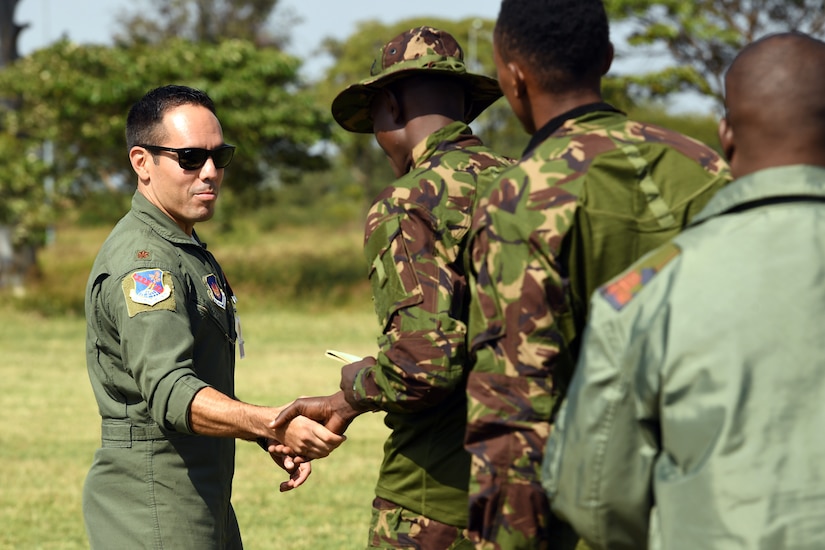
Both the departments of State and Defense have been working for over two years to better integrate civilian protection into arms transfers.
"The Defense Security Cooperation Agency, in close cooperation with the Department of State, has expanded its efforts to include promotion of civilian protection in both foreign military sales and security cooperation," a Defense Department official said. "And this includes expanding training for partners and providing additional advisory support with a specific emphasis on mitigation of civilian harm."
The program is worldwide and in line with U.S. efforts to share the security burden. This means building strong security institutions that respect the rule of law and human rights. "Civilian harm caused by U.S.-supported partner forces pose[s] a risk to the reputation of the United States and to our strategic objectives," the State official said.
The process involves sharing best practices with foreign partners and runs the gamut from new processes to new equipment to training.
While the State Department oversees foreign military sales policy, the Defense Security Cooperation Agency must put in place the processes needed to minimize civilian deaths. The agency has expanded the scope of what it can offer partners, ranging from new curriculum for civilian harm mitigation training, to the development of advisory materials and services, to technical solutions to help partners more effectively and responsibly conduct operations.
"We've also been working on conducting assessments of a partner's risk of causing civilian harm during military operations, and identifying the means to help mitigate such risks," the State Department official said.
The emphasis on preventing civilian deaths is part of the process [in deciding] whether a potential military sale or grant should even be made, the State Department official said.
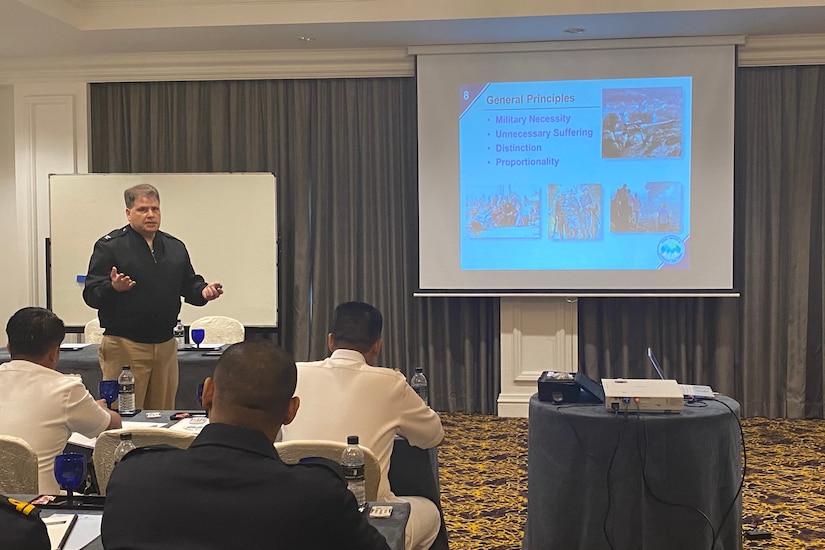
U.S. efforts in Saudi Arabia pre-dated the conventional arms transfer policy and can be used to inform approaches with other partners moving forward. The United States established a comprehensive plan to work with the Saudi-led coalition against the Houthi rebels to reduce the risk of civilian harm. This has included law of armed conflict targeting training, regular key leader engagement, training seminars for the entire targeting lifecycle, including U.S. advisors, officials said. The U.S. also recently sold additional technical capabilities to allow more precise and effective deployment of munitions.
A good specific example is the collateral damage estimation methodology the U.S. offers that was also adopted by NATO. "It is something that the U.S. develops and updates and releases," the Defense official said. "It's something that the U.S. focuses on that you wouldn't have the ability to get through other arms partners."
The United States needs partner nations to be responsible with U.S.-supplied weapons systems, and the partners also want this. "We want to give them the tools … to succeed and the tools to be effective," the State Department official said. "The partners themselves really put a premium on being … effective and having effective and professional militaries."
Tuskegee University Army ROTC cadet navigates a rope obstacle during training at Fort Benning, Ga., Sept. 19, 2020.
The CATCH a Serial Offender program continues to be available for sexual assault victims amid the COVID-19 pandemic.
Although social distancing and other safety measures continue to be implemented across the nation, victims may still call their local sexual assault response coordinator (SARC) or sexual assault prevention and response (SAPR) victim advocate to file a confidential report, known as a restricted report, and participate in the CATCH program. CATCH program entries can be filled in online after being provided a user name and password.
The CATCH program provides Service members and their adult dependents who have filed a restricted report of sexual assault a new confidential way to provide information about the alleged offender and incident to DOD criminal investigators without initiating an investigation in an effort to identify repeat offenders.
“We encourage anyone who is about to file a restricted report or who has already done so in the past to consider signing up for the CATCH program,” said Dr. Nate Galbreath, acting director of the DOD Sexual Assault Prevention and Response Office. “It’s still an available option even amid the COVID-19 pandemic, takes a short amount of time, and can lead to justice for you and others.”
Investigators from each Military Criminal Investigative Organization headquarters review entries in the CATCH system and compare them against other CATCH entries and unrestricted reports in other law enforcement databases to identify potential matches.
When a potential match is identified, a specially-trained CATCH point of contact privately notifies the victim, who is given the option to convert his or her restricted report to an unrestricted report and participate in the investigative and military justice process, as appropriate.
Those contributing a report to CATCH decide their level of involvement in the program and can decline to participate anytime, even after a match is identified.
For more information about the CATCH program please visit https://www.sapr.mil/catch.
For support, the DOD Safe Helpline is a hotline dedicated to members of the DOD community affected by sexual assault. The Safe Helpline offers completely anonymous, confidential, 24/7 support available online at www.safehelpline.org or by calling 877-995-5247. In addition, the Safe Helpline Mobile App provides access to one-on-one support, peer-to-peer support, information, resources and also access self-care exercises 24/7, worldwide on a mobile device. Safe Helpline personnel can provide crisis intervention support and refer members to long-term care resources within their local community or via the local SARC or SAPR VA.
Meet some of the sexual assault prevention and response (SAPR) victim advocates from each military service who are ready to assist sexual assault survivors. Learn more here.
Marine Corps Cpl. Robert Rosa conducts training with a practice fire shelter at Marine Corps Base Camp Pendleton, Calif., Sept. 18, 2020. Marines and sailors assisted the U.S. Forest Service with fires in California.
Army Cpt. Yesenia Stablehaus checks the heartbeat of an injured falcon at Camp Arifjan, Kuwait, Sept. 21, 2020.
Sailors arrive with equipment and supplies at Naval Air Station Pensacola, Fla., Sept. 19, 2020, while supporting disaster relief efforts following Hurricane Sally.
An airman presents World War II veteran Charles Dever with an American flag from the Vandenberg Air Force Base Honor Guard for Dever’s 105th birthday in Goleta, Calif., Sept. 20, 2020.
A Marine practices digging a fire line near the Sierra National Forest, Calif., Sep. 21, 2020. Marines and sailors assisted the U.S. Forest Service with fires in California.
Navy Petty Officer 1st Class Arthur Phillips collects care packages from the family and friends of sailors assigned to USS Lake Erie before departing San Diego, Aug. 9, 2020.
Sept. 23, 2020 | BY Allison Conti, Navy
In early 2020, Norfolk Naval Shipyard, along with the rest of the country, found itself facing an unprecedented and unpredictable opponent: COVID-19. The shipyard began its efforts to combat the virus in March, quickly looking for new and innovative ideas to help aid in the fight and keep its workforce safe. One of those ideas was to install personnel guards in spaces where physical distancing wasn't always possible.

Since April, NNSY's Nuclear Sheet metal Shop, or Shop 17, has installed more than 6,000 square feet of protective personnel guards at NNSY, its satellite locations at Naval Station Norfolk and Nuclear Power Training Unit-Charleston, South Carolina. The idea first came about when the shop received a call from the radiation training team asking if there were any safety protections that would allow classroom training to resume. According to NNSY’s Structural Group (Code 920) Nuclear Director Brandon Williams, the team began brainstorming ideas that would use materials the shop already had on hand.
"We built several prototypes to ensure sightlines were maintained for the user while maximizing their protection from others" Williams said.
While working on their initial prototypes, the team quickly determined that there was not a one-size-fits-all solution for the barriers.
"Rather than produce standard-sized personnel guards, we decided that the most effective approach would be to take orders, go directly to the site requesting a personnel guard to take measurements and customize the item for the space where it would be installed," Williams added.
Five months later, Shop 17 has the process down to a science. Employees who are in need of a personnel guard send an email to the shop with the employee's contact information and location. Within 24 hours, a team member contacts the requesting employee via telephone and schedules an appointment to measure the space. Once the space is measured, the shop begins the fabrication process. This process takes approximately five working days, after which the lead team member will contact the requesting employee to schedule a delivery and installation time. The installation takes about an hour, according to Williams, but the timing can vary depending on the nature of the job.
While all of Shop 17 works to fabricate and install the personnel guards, the primary team behind the effort includes Nuclear Inside Shop (Shop 17) Supervisor James Wilkins and Sheet metal Mechanics Matthew Legg, Brian Nipper, Monica Cooper, Tom Deller and Steven Myers.
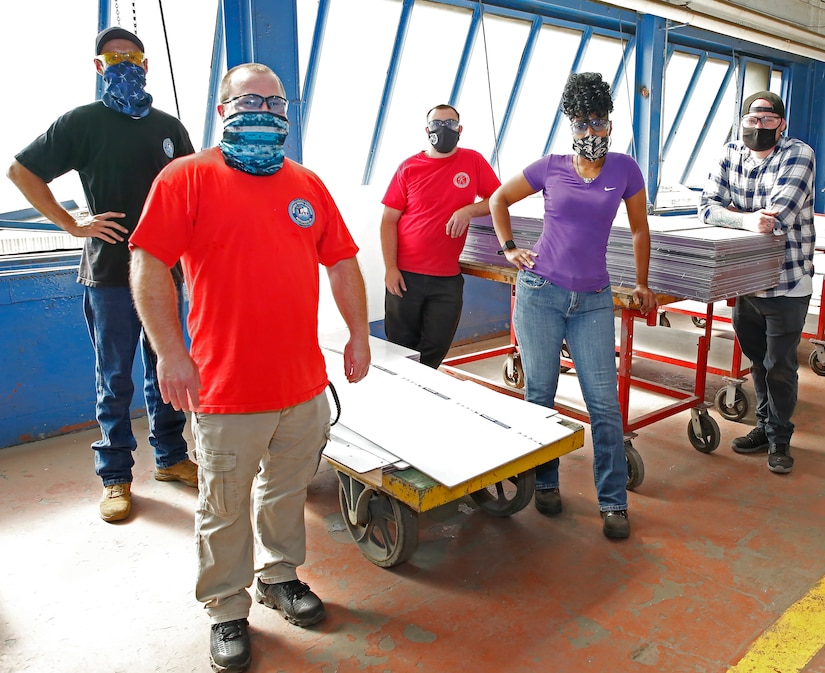
The work being completed by the Shop 17 team is in direct support of guidelines issued by the Centers for Disease Control and Prevention in partnership with the Occupational Safety and Health Administration.
"These guidelines indicate the importance of keeping the workforce healthy during the COVID-19 pandemic," Williams said. "One of the engineering controls recommended by the CDC is the installation of physical barriers where feasible. These personnel guards serve as physical barriers in an attempt to keep the workforce healthy and able to serve the fleet."
The personnel guards are especially important in spaces where physical distancing can be difficult, such as locations on the NNSY waterfront. The project is one of many innovative measures NNSY has used to keep its workforce protected and safe -- a task directly tied to the shipyard's mission, according to Williams.
"By improving our mitigation measures against COVID-19, our workforce can remain healthier, which results in increased man-hours, production and ultimately the readiness of the fleet," he said.
Williams said he has an immense gratitude for his team members and the continued dedication, hard work and commitment they've shown in the battle against COVID-19. He said that the work being done by Shop 17 Nuclear is "true to the C.O.R.E. values of NNSY helping to keep coworkers safe."
(Allison Conti is assigned to the Norfolk Naval Shipyard).
Sept. 23, 2020 | BY Air Force Capt. Hans Zeiger
Six newly-enlisted members of the Washington Air National Guard are serving in a domestic operations support role for the first time in state history, working at food banks alongside soldiers and airmen in response to the COVID-19 pandemic. The enlistees are members of the 194th Wing's student flight, which helps to prepare future airmen as they await basic military training and technical training.
"It's the first time this has ever happened in Washington State," said Air Force Senior Master Sgt. John Austin, superintendent of the Washington Air National Guard's 194th Force Support Squadron, who oversees the student flight.

As a result of intensive tasking for guard members in food bank support, voluntary COVID-19 mapping support to the Washington State Department of Health, military assistance for civil disturbances and other training and deployment requirements, Washington Air National Guard leaders recognized a need for additional personnel.
"Our volunteer pool was dwindling," Austin said.
While new enlistees cannot serve on federal missions before they have completed formal training, there is an allowance for them to serve in a state active duty status, Austin said.
After Washington National Guard leadership authorized new enlistees to volunteer for the food bank support mission, Austin put out the word to his student flight members in early August.
Christine Krysiak of Parkland came onto state active duty in August, just weeks after graduating from Franklin Pierce High School. She follows her father, grandfather and great uncle in joining the Air National Guard, and Krysiak's sister serves on active duty in the Air Force. Krysiak was assigned to the Bonney Lake Food Bank, where she helps to pack food and make home deliveries.
"We're helping out the community, and that's what matters," said Krysiak. "Everybody has been impacted by COVID-19. We don't know their situation, and we can't judge. We can only imagine what they could be going through."
Krysiak has seen the impact of her work on community members.
"It's cool to see people come in and say thank you for everything that we do," Krysiak said.
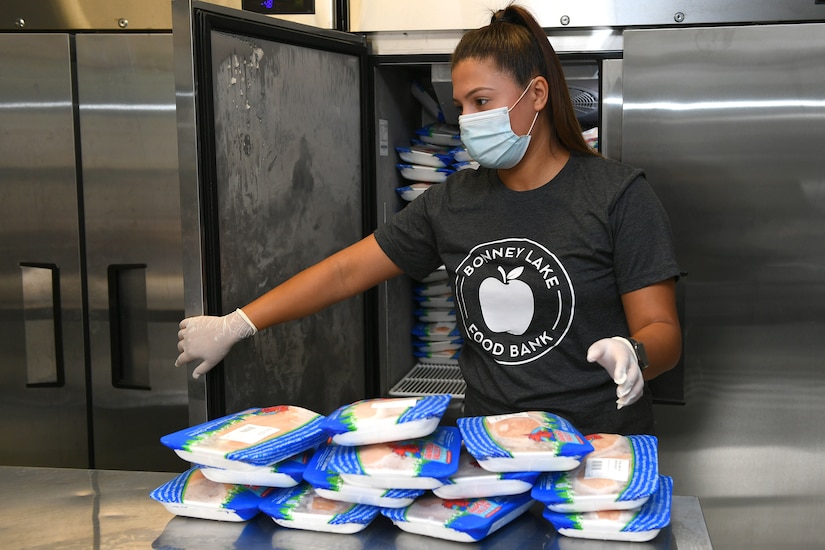
For Air Force Airman Sara Mark, the opportunity to serve at the Nourish Pierce County warehouse in her hometown of Lakewood came as she awaits technical training to be a personnel specialist in the 194th Force Support Squadron. With reduced hours in her civilian job, it worked well for her to join the guard's food bank mission.
"I did want to help out the community during this pandemic," Mark said. "A lot of people can't afford food, so it's nice to be a helping hand."
Eric Cunningham of Shelton enlisted in the guard over the summer to become a member of the 194th Security Forces Flight. Two years out of high school, Cunningham worked in construction but he was able to take on a role with the guard at a food packing facility in Lakewood shortly after swearing into the military. Cunningham works with other members of the 194th Wing to make boxes that are used for packing.
"We make 2,000 boxes a day, which is 40 pallets worth," Cunningham said. "We're pretty efficient I'd say."
Cunningham said he sees value in his time on state active duty as he prepares for formal training.
"It helps me get more involved with the military before I go to basic military training," Cunningham said. "One advantage of interacting with Airmen who have already been through training, is that they can give advice on his next steps in military service."
During their time on state active duty, student flight members worked alongside experienced Air National Guard members who are designated to guide them.
"It's good Air Force mentorship," Austin said. "They are getting good experience that they would not otherwise have. They're learning to work in a team environment. They're learning about joint relationships with the Army."
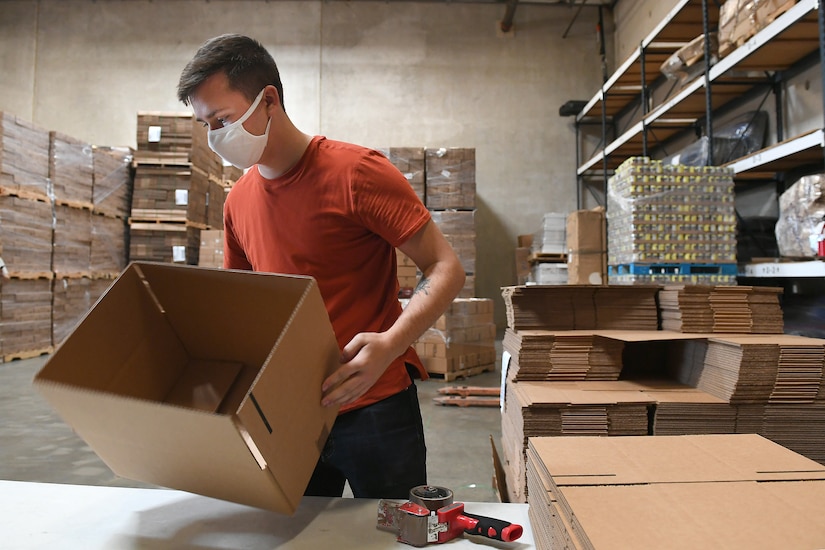
Student flight members mention teamwork as a highlight of their service experience.
"Even though we're in different branches, it's nice being part of a team," Mark said. "I like the emphasis on teamwork," Cunningham said.
And even though student flight members have just begun their journey in military service, they are already being integrated into a domestic operations mission.
"I feel included," Krysiak said. "I don't wear the uniform, but I'm still a part of them."
Altogether, Washington National Guard members have taken part in processing, packaging and distributing more than 45 million pounds of food since the start of the COVID-19 emergency. For Austin, the work that members of his student flight are performing is at the heart of why the guard exists.
"This is what the National Guard is about, to help out our community by jumping in early, getting fully organized," Austin said.
(Air Force Capt. Hans Zeiger is assigned to the 194th Wing)